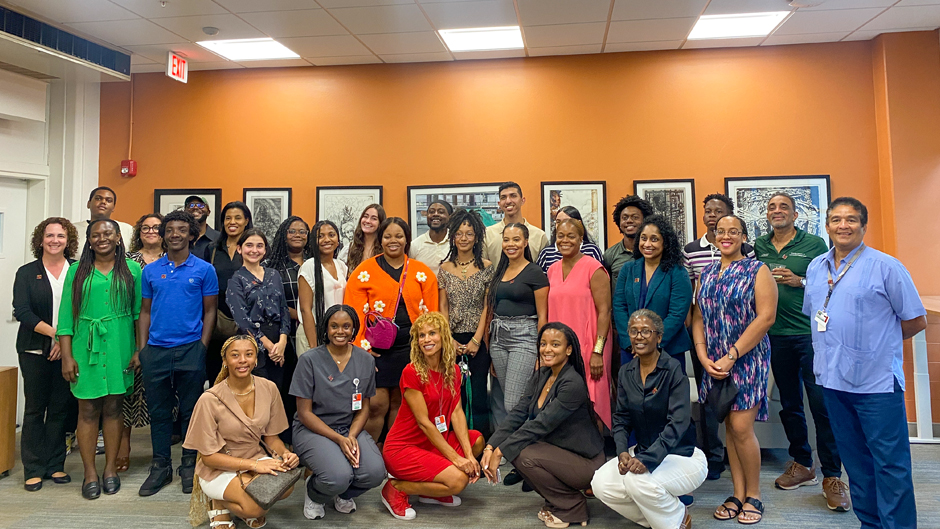The University of Miami Center for Global Black Studies and the Cardiovascular Research Empowerment Workforce (CREW) program at the Leonard M. Miller School of Medicine brought minority students together to welcome undergraduates from the U.S. Virgin Islands and build a network to empower the next generation of health care scholars.
The Minorities in Medicine Networking Reception, hosted at the Center for Global Black Studies in mid-June, was attended by scholars from the Summer Training in Research Program and the Diversity in Cancer Research Internship Program, developed at Sylvester Comprehensive Cancer Center, as well as interdisciplinary physicians and scientists from the Miller School of Medicine. Vibrant discussions and collaboration filled the center as the students mingled and began developing a supportive network for future leaders focused on improving minority health outcomes.
The reception welcomed undergraduate students in the CREW program who recently traveled from the U.S. Virgin Islands to Miami to kick off an eight-week research training curriculum focused on cardiovascular science. The students spent two weeks at the Miller School of Medicine before immersing themselves in a six-week mentored public health research project in the U.S. Virgin Islands dedicated to improving cardiovascular health in the local community.
“Since there are not enough minorities in medicine to deliver care to all of the minorities who need it in the United States, it is deeply important for minorities who are embarking on health care careers to identify supportive colleagues who are experiencing similar challenges and identify strategies to overcome systemic racism that has been repeatedly identified as a major barrier to health care leadership opportunities for minorities,” said Sonjia Kenya, principal investigator of the CREW summer training program and professor of medicine.
Through the CREW program, Black health care leaders from the University and the U.S. Virgin Islands collaborate to train and inspire the next generation of cardiovascular scientists to pursue research careers that improve the islands’ health care infrastructure.
In partnership with the University of the Virgin Islands, a historically Black university, the CREW program will host 10 undergraduate students each summer for the next five years. Funded by the National Heart, Lung, and Blood Institute, CREW’s ultimate goal is to build a robust health care workforce that will serve the U.S. Virgin Islands, using culturally informed strategies to improve cardiovascular outcomes. In addition to providing students with hands-on research experience, the CREW program encourages trainees to build careers in the islands as a strategy to overcome the territory’s long-standing designation as a health professional shortage area.
“The U.S. Virgin Islands suffers some of the worst rates of adverse cardiovascular outcomes in the United States,” wrote the U.S. Virgin Islands Department of Health in a January 2024 statement. “With more than 40 percent of health care positions vacant, the territory also experiences significant health care workforce shortages—and a majority of caregivers in the territory hail from outside the U.S. Virgin Islands—making delivery of local, culturally tailored care challenging.”
The CREW program also provides students with an introduction to Miami, including the University’s Coral Gables Campus and Miami-Dade County’s Metrorail system. Mariella Stout and Jaresia Elliot-Hendrickson, two of the 10 CREW scholars, said they looked forward to their two weeks on campus before returning to the U.S. Virgin Islands.
At the reception, these scholars were joined by faculty from across the University, fostering a supportive network of collegial support to overcome barriers in achieving and maintaining health care leadership opportunities.
“[The CREW program was] so honored to be invited to collaborate with the Center for Global Black Studies because this is UM’s hub for Black scholarship, whether students are training to become leaders in health care, politics, or education,” Kenya said. “The Center for Global Black Studies provides our institution with a centralized cultural home. We are eternally grateful to Dr. Francis, the Center director, for extending such robust support to welcome CREW scholars and other minority trainees. This event ensured that all program participants knew they are not alone on their journey into health care careers.”
For the Center for Global Black Studies and the CREW program organizers, celebrating undergraduate students with robust community support is necessary to build an equitable space. The Diversity in Cancer Research program, led by Sophia George from Sylvester Comprehensive Cancer Center at the University of Miami Miller School of Medicine, co-sponsored the event and highlighted the importance of developing more collaborative support activities for all medical trainees focused on improving health equity.
“The mission of the Center for Global Black Studies is to create a dynamic intellectual culture here at the University of Miami, and it is important to establish these intellectual networks across the various campuses,” said Donette Francis, the director for the Center for Global Black Studies and an associate professor of English in the College of Arts and Sciences. “There is a shared curiosity about multidisciplinary research pertaining to Black lives and knowledge in the United States and beyond.”

